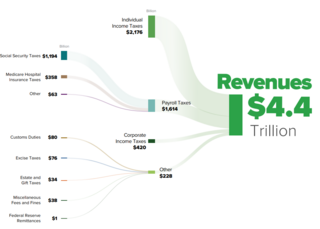
The United States has separate federal, state, and local governments with taxes imposed at each of these levels. Taxes are levied on income, payroll, property, sales, capital gains, dividends, imports, estates and gifts, as well as various fees. In 2020, taxes collected by federal, state, and local governments amounted to 25.5% of GDP, below the OECD average of 33.5% of GDP.

The United States Tax Court is a federal trial court of record established by Congress under Article I of the U.S. Constitution, section 8 of which provides that the Congress has the power to "constitute Tribunals inferior to the supreme Court". The Tax Court specializes in adjudicating disputes over federal income tax, generally prior to the time at which formal tax assessments are made by the Internal Revenue Service.
Accountant–client privilege is a confidentiality privilege, or more precisely, a group of privileges, available in American federal and state law. Accountant–client privileges may be classified in two categories: evidentiary privileges and non-evidentiary privileges.
A Taxpayer Identification Number (TIN) is an identifying number used for tax purposes in the United States and in other countries under the Common Reporting Standard. In the United States it is also known as a Tax Identification Number (TIN) or Federal Taxpayer Identification Number (FTIN). A TIN may be assigned by the Social Security Administration (SSA) or by the Internal Revenue Service (IRS).

The Internal Revenue Service Restructuring and Reform Act of 1998, also known as Taxpayer Bill of Rights III, resulted from hearings held by the United States Congress in 1996 and 1997. The Act included numerous amendments to the Internal Revenue Code of 1986. The bill was passed in the Senate unanimously, and was seen as a major reform of the Internal Revenue Service.
Tax preparation is the process of preparing tax returns, often income tax returns, often for a person other than the taxpayer, and generally for compensation. Tax preparation may be done by the taxpayer with or without the help of tax preparation software and online services. Tax preparation may also be done by a licensed professional such as an attorney, certified public accountant or enrolled agent, or by an unlicensed tax preparation business. Because United States income tax laws are considered to be complicated, many taxpayers seek outside assistance with taxes.
Tax protesters in the United States have advanced a number of arguments asserting that the assessment and collection of the federal income tax violates statutes enacted by the United States Congress and signed into law by the President. Such arguments generally claim that certain statutes fail to create a duty to pay taxes, that such statutes do not impose the income tax on wages or other types of income claimed by the tax protesters, or that provisions within a given statute exempt the tax protesters from a duty to pay.

Internal Revenue Service, Criminal Investigation (IRS-CI) is the United States federal law enforcement agency responsible for investigating potential criminal violations of the U.S. Internal Revenue Code and related financial crimes, such as money laundering, currency transaction violations, tax-related identity theft fraud and terrorist financing that adversely affect tax administration. While other federal agencies also have investigative jurisdiction for money laundering and some Bank Secrecy Act violations, IRS-CI is the only federal agency that can investigate potential criminal violations of the Internal Revenue Code, in a manner intended to foster confidence in the tax system and deter violations of tax law. Criminal Investigation is a division of the Internal Revenue Service, which in turn is a bureau within the United States Department of the Treasury.
Circular 230 refers to Treasury Department Circular No. 230. This publication establishes the rules governing those who practice before the U.S. Internal Revenue Service (IRS), including attorneys, certified public accountants (CPAs) and enrolled agents (EAs).
A tax levy under United States federal law is an administrative action by the Internal Revenue Service (IRS) under statutory authority, generally without going to court, to seize property to satisfy a tax liability. The levy "includes the power of distraint and seizure by any means". The general rule is that no court permission is required for the IRS to execute a tax levy.
The Special Enrollment Examination is a test that individuals can take to become an Enrolled Agent in the United States. The Enrolled Agent credential is conferred and regulated by the Internal Revenue Service (IRS). The exam consists of three parts:
A tax protester is someone who refuses to pay a tax claiming that the tax laws are unconstitutional or otherwise invalid. Tax protesters are different from tax resisters, who refuse to pay taxes as a protest against a government or its policies, or a moral opposition to taxation in general, not out of a belief that the tax law itself is invalid. The United States has a large and organized culture of people who espouse such theories. Tax protesters also exist in other countries.
The National Association of Enrolled Agents (NAEA) is an organization of enrolled agents (EAs) in the United States. Founded in 1972, it claims a membership of 11,000 EAs.
Tax protesters in the United States advance a number of administrative arguments asserting that the assessment and collection of the federal income tax violates regulations enacted by responsible agencies –primarily the Internal Revenue Service (IRS)– tasked with carrying out the statutes enacted by the United States Congress and signed into law by the President. Such arguments generally include claims that the administrative agency fails to create a duty to pay taxes, or that its operation conflicts with some other law, or that the agency is not authorized by statute to assess or collect income taxes, to seize assets to satisfy tax claims, or to penalize persons who fail to file a return or pay the tax.
The IRS Return Preparer Initiative was an effort by the Internal Revenue Service (IRS) to regulate the tax return preparation industry in the United States. The purpose of the initiative is to improve taxpayer compliance and service by setting professional standards for and providing support to the tax preparation industry. Starting January 1, 2011 and, until the program was suspended in January 2013, the initiative required all paid federal tax return preparers to register with the IRS and to obtain an identification number, called a Preparer Tax Identification Number (PTIN). The multi-year phase-in effort called for certain paid tax return preparers to pass a competency test and to take annual continuing education courses. The ethics provisions found in Treasury Department's Circular 230 were extended to all paid tax return preparers. Preparers who have their PTINs, pass the test and complete education credits were to have a new designation: Registered Tax Return Preparer.
The National Society of Public Accountants (NSPA), later shortened to National Society of Accountants (NSA), is a professional association for tax and accounting professionals; NSA and its state affiliates represent more than 30,000 independent practitioners who provide accounting, tax, auditing, financial and estate planning, and management services to 19 million individuals and businesses. NSA's mission is to provide national leadership in the profession of accountancy and taxation through the advocacy of practice rights, and by the establishment and promotion of high standards in ethics, education, and professional excellence.
In the United States, an income tax audit is the examination of a business or individual tax return by the Internal Revenue Service (IRS) or state tax authority. The IRS and various state revenue departments use the terms audit, examination, review, and notice to describe various aspects of enforcement and administration of the tax laws.
Tax audit representation, also called audit defense, is a service in which a tax or legal professional stands in on behalf of a taxpayer during an Internal Revenue Service (IRS) or state income tax audit.
A Registered Tax Return Preparer is a former category of federal tax return preparers created by the U.S. Internal Revenue Service (IRS).
The Registered Tax Return Preparer Test was a test produced by the U.S. Internal Revenue Service (IRS). Until the program was suspended in January 2013, the IRS had implemented rules requiring that certain individuals who wanted to work as tax return preparers pass this test to demonstrate their ability to understand U.S. tax law, tax form preparation and ethical requirements. The competency test was part of an agency effort to better regulate the tax return preparation industry, to improve the accuracy of tax return preparation and to improve service to taxpayers. Candidates who passed the test, a tax compliance check, and met certain other requirements had a new designation: Registered Tax Return Preparer.




